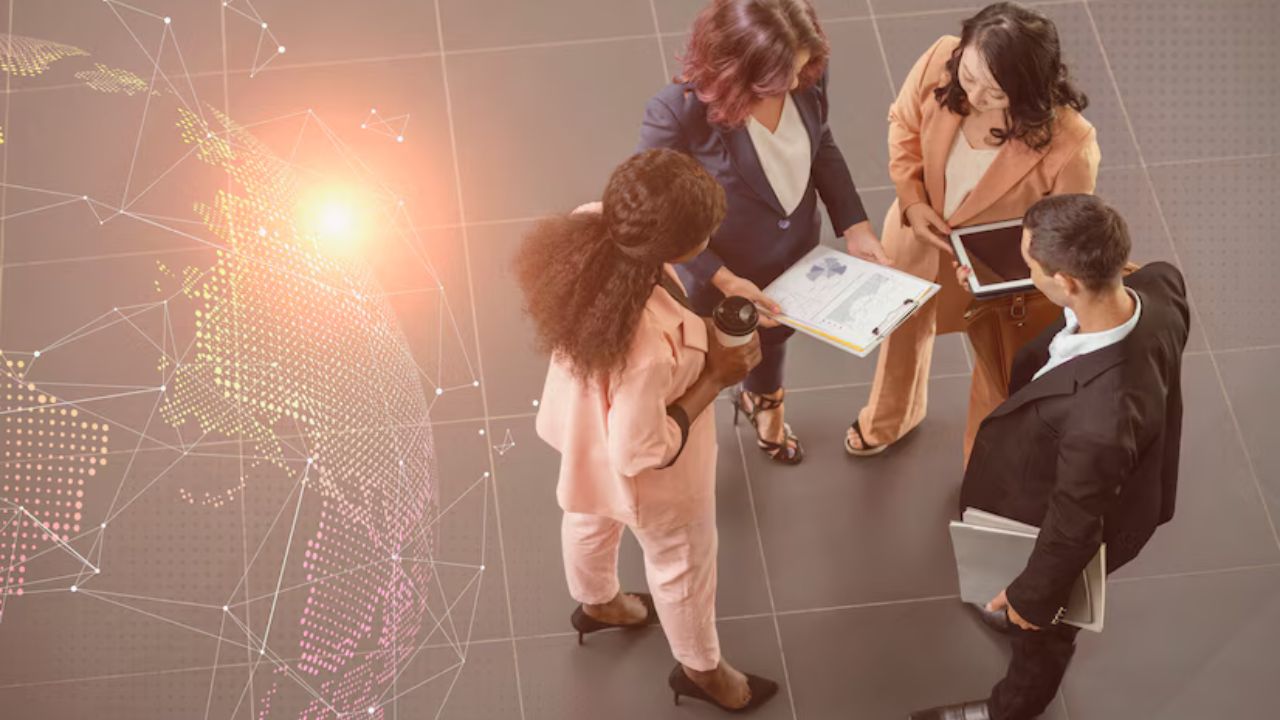GENERAL
Discovering Your Location Without Borders

In a world that’s becoming increasingly connected, it’s fascinating how often we still find ourselves asking, “What country am I in?” Whether you’re a globetrotter, a digital nomad, or simply someone who enjoys the occasional travel adventure, pinpointing your exact location can sometimes be a puzzling task. This blog post is here to unravel that mystery and offer you a toolbox of methods to identify your whereabouts seamlessly.
You’ll learn about the technological advancements that allow us to determine our locations as well as practical tips for when those technologies may not be at hand. We’ll explore everything from GPS and mobile apps to the subtle signs and cultural cues that can reveal your current country. Join us on this explorative journey as we guide you through the art of location discovery.
The Power of GPS Technology
GPS, or Global Positioning System, is the backbone of modern location services. This network of satellites orbiting Earth provides precise information about your location anywhere on the globe. It’s used in everything from aviation to everyday navigation through your smartphone.
When you use a mapping app, your device communicates with these satellites to triangulate your position. The data is processed quickly, providing you with an accurate location. But while GPS is powerful, it isn’t infallible. Dense urban areas and remote locations with limited satellite visibility can challenge signal reception.
For those moments when GPS fails, knowing alternative ways to determine your location becomes essential. Understanding the limitations of GPS helps you appreciate why diversifying your approach can be beneficial.
Leveraging Mobile Apps for Instant Location
Smartphones have revolutionized the way we travel and communicate. With a plethora of apps designed to track and share your location, you can answer “What country am I in?” with just a few taps. Apps like Google Maps, Apple Maps, and even weather apps often include location services that can pinpoint your locale swiftly.
Many of these applications use a combination of GPS, Wi-Fi, and cell tower triangulation to provide accurate location data. This multi-faceted approach ensures reliability in various environments, whether you’re in a bustling city or a rural area.
However, reliance on mobile apps also means dependence on battery life and internet connectivity. While convenient, always having a backup plan for those times when technology isn’t on your side is wise.
Navigating Without Technology
There may be times when you find yourself in a place without access to technology. In those instances, traditional navigation skills become invaluable. Start by observing the natural environment around you. The position of the sun, the direction of local rivers, and the types of vegetation can provide clues about your location.
Cultural cues are equally telling. Language on public signs, local customs, and currency can help you deduce your country. Engage with locals by asking simple questions about your surroundings. Most people are happy to help a traveler in need.
Learning to read these signs will not only help you figure out where you are but also enrich your travel experience by immersing you more deeply in the local culture.
Recognizing Cultural and Linguistic Cues
Language is one of the most immediate indicators of location. Pay attention to the language spoken around you and any written text. While some languages are spoken across multiple countries, dialects and accents can further narrow down your whereabouts.
Cultural practices, such as prevalent cuisine, architectural styles, and traditional attire, offer additional insights. These elements are often unique to specific regions and can reinforce your understanding of your current location.
By being observant and open to learning, you can become adept at recognizing the subtle cultural markers that define each country.
Harnessing the Power of Maps
Maps have been fundamental tools for navigation for centuries. While digital maps are convenient, don’t underestimate the value of physical maps. They provide a reliable reference point when digital devices are unavailable, and they never run out of battery.
Familiarize yourself with reading different types of maps, from topographical to road maps. Understanding map symbols and scales will enhance your ability to interpret the data they present.
Keep a small, foldable map in your travel kit as a backup. It’s a low-tech solution that can be incredibly helpful in unfamiliar territories.
Understanding Geopolitical Boundaries
Borders define countries, but they aren’t always visible. Many are natural boundaries like rivers and mountains, while others are marked by man-made structures or simply the change in road signage.
Studying an area’s geopolitical history can provide insight into current boundary lines. Knowledge of historical events like wars and treaties can explain why certain regions belong to specific countries.
While traveling, respect these borders and understand the regulations that accompany them. Being informed minimizes the risk of inadvertently crossing into another country.
Using Online Resources for Real-Time Information
The internet is a treasure trove of information for travelers. Websites and forums dedicated to travel can offer real-time updates on your current location and nearby attractions.
Social media platforms also serve as valuable tools. Engaging with fellow travelers or locals through groups and hashtags can yield helpful tips and advice.
Bookmark a few reliable travel websites and forums before your trip, ensuring you have access to credible information whenever you need it.
The Role of Technology in Modern Travel
Technology shapes the way we explore the world. From AI-driven personal assistants to augmented reality apps, innovations continue to enhance our travel experiences.
Stay updated with the latest technological trends in travel. New gadgets and apps can provide unprecedented convenience and safety during your journeys.
However, balance is key. Technology should aid your adventure without overshadowing the authentic experiences travel offers. Use it as a tool rather than a crutch.
The Importance of Travel Preparedness
Preparation is crucial when embarking on any trip. Research your destination beforehand, noting key locations, emergency contacts, and transportation options.
Pack essentials like a universal charger, a portable power bank, and a travel adapter to keep your devices functional. A small first-aid kit can also be invaluable in emergencies.
Being prepared allows you to tackle unexpected challenges with confidence, ensuring a smoother and more enjoyable travel experience.
Staying Safe and Informed While Traveling
Safety is paramount when exploring new places. Always be aware of your surroundings and trust your instincts if something feels off.
Keep friends or family updated on your location and itinerary. Share important documents like your passport and travel insurance details with someone you trust.
By taking proactive measures, you can reduce risks and focus on the enriching aspects of your adventures.
Conclusion: Embark on Your Next Journey with Confidence
Discovering your location, whether through technology or traditional means, is an essential skill for any traveler. By combining modern tools with age-old techniques, you can confidently answer the question, “What country am I in?” at any moment.
Remember, travel is about exploration and discovery. Don’t shy away from venturing into the unknown. With the right preparation and mindset, you’re ready to take on the world, one country at a time.
If you’re eager to learn more about location-based travel tips, consider exploring our recommended resources or joining a community of like-minded travelers. Your next adventure awaits!
GENERAL
elijah craig old fashioned syrup: The Ultimate Guide

The Old Fashioned is more than just a cocktail; it’s a classic that has stood the test of time. For many, it represents the pinnacle of mixology—a perfect balance of sweetness, bitterness, and spirit. But what if you could make the perfect Old Fashioned effortlessly? Enter Elijah Craig Old Fashioned Syrup. This guide will show you how to elevate your cocktail game, making you the star of any gathering.
What Makes the Old Fashioned an Icon
The Old Fashioned has a rich history dating back to the early 1800s. It’s a simple yet elegant cocktail that has retained its popularity for over two centuries. Made with whiskey, sugar, water, and bitters, it’s a drink that highlights the quality of the ingredients. Elijah Craig Old Fashioned Syrup simplifies this classic recipe, making it accessible to everyone.
Understanding Elijah Craig Old Fashioned Syrup
Elijah Craig Old Fashioned Syrup is crafted to provide a balanced mix of sweetness and bitterness, aimed at elevating your cocktail experience. It combines high-quality ingredients like demerara sugar and aromatic bitters, ensuring that each sip is as satisfying as the last. This syrup captures the essence of a traditional Old Fashioned while offering convenience without compromising on taste.
Why Choose Elijah Craig Old Fashioned Syrup
Selecting the right syrup can make or break your cocktail. Elijah Craig Old Fashioned Syrup is designed for those who value both quality and convenience. It takes the guesswork out of cocktail making, allowing you to focus on enjoying your drink. Plus, its consistency means you get the perfect Old Fashioned every time, whether you’re a novice or an expert.
Crafting Your First Elijah Craig Old Fashioned
Making your first cocktail with Elijah Craig Old Fashioned Syrup is straightforward. Start by adding one ounce of the syrup to a glass with two ounces of Elijah Craig Bourbon. Stir to blend, then add a large ice cube. Garnish with an orange twist and a cherry. This simple method ensures a well-balanced drink every time.
The Perfect Glassware for Your Old Fashioned
The right glassware can enhance your drinking experience. A heavy-bottomed, short glass is ideal for an Old Fashioned. This type of glass not only feels substantial in hand but also maintains the cocktail’s temperature. Investing in quality glassware can make your Old Fashioned even more enjoyable.
Elevating Your Old Fashioned with Garnishes
Garnishes are more than just decoration; they add complexity to your drink. An orange twist releases essential oils that complement the bourbon and syrup. A cherry provides a burst of sweetness that balances the bitters. Experiment with different garnishes to find your perfect combination.
The Importance of Ice in an Old Fashioned
Ice plays a crucial role in your cocktail. Large ice cubes melt slower, keeping your drink from diluting too quickly. Clear ice is preferred as it looks better and melts slower than cloudy ice. The right ice can make a significant difference in the overall enjoyment of your Old Fashioned.
Exploring Variations of the Old Fashioned
While the classic Old Fashioned is a staple, there are many variations to explore. Try adding a dash of flavored bitters, such as orange or chocolate, for a unique twist. You can also experiment with different types of whiskey, like rye or Scotch, to discover new flavor profiles.
Hosting the Ultimate Old Fashioned Party
Hosting a party? Impress your guests by setting up an Old Fashioned bar. Provide different types of whiskey, a variety of bitters, and garnishes. Set out Elijah Craig Old Fashioned Syrup for a foolproof mix. This setup allows your guests to customize their drinks while ensuring everyone enjoys a quality cocktail.
Pairing Food with Your Old Fashioned
The Old Fashioned pairs well with various foods. Its robust flavors complement hearty dishes like steaks and barbecue. For lighter fare, try pairing it with cheese or nuts. The key is to balance the cocktail’s strong flavors with foods that can stand up to them.
The Health Benefits of Moderate Whiskey Consumption
Moderate whiskey consumption has been linked to several health benefits. It’s rich in antioxidants and can help reduce stress. Enjoying an Old Fashioned in moderation can be part of a balanced lifestyle. Remember, the key is moderation.
The Environmental Impact of Elijah Craig’s Ingredients
Elijah Craig is committed to sustainability. The ingredients used in their Old Fashioned Syrup are sourced responsibly, ensuring minimal environmental impact. By choosing Elijah Craig, you’re not only enjoying a quality cocktail but also supporting eco-friendly practices.
Customer Reviews and Testimonials
Don’t just take our word for it; hear what others have to say. Customers rave about the convenience and taste of Elijah Craig Old Fashioned Syrup. Many appreciate how it elevates their home bartending game, making it easy to impress friends and family.
Frequently Asked Questions
Many people have questions about using Elijah Craig Old Fashioned Syrup. How long does the syrup last? What’s the best way to store it? Can it be used in other cocktails? Addressing these questions can help you get the most out of your syrup and enhance your overall experience.
Final Thoughts on Mastering the Old Fashioned
Mastering the Old Fashioned is about balance and quality. Elijah Craig Old Fashioned Syrup offers both, making it easier than ever to enjoy this classic cocktail. Whether you’re a seasoned mixologist or a home bartender, this syrup can elevate your drink game.
GENERAL
Blephagel gel 1.06 ounces

Welcome to a comprehensive guide on Blephagel gel 1.06 ounces – your go-to solution for clear, healthy eyes! If you’re looking to improve your eye hygiene and combat irritations effectively, this blog post is tailored just for you. Discover how to use Blephagel gel correctly, its benefits, possible side effects, where to purchase it, real-life customer reviews, and ultimately decide if this product is the right choice for you. Let’s dive in!
Blephagel gel 1.06 ounces
Blephagel gel 1.06 ounces is a specially formulated eye gel designed to cleanse and soothe the delicate skin around your eyes. Its gentle yet effective formula helps remove debris, bacteria, and makeup residues that can accumulate throughout the day.
Using Blephagel gel correctly is simple – just apply a small amount onto clean fingertips and gently massage it into your eyelids in circular motions. Rinse thoroughly afterward for maximum comfort and cleanliness.
One of the key benefits of Blephagel gel is its ability to maintain eye hygiene by preventing the buildup of crusts or scales on your eyelids. Regular use can help alleviate symptoms associated with conditions like blepharitis and dry eye syndrome.
As with any skincare product, there may be some side effects to consider when using Blephagel gel. These can include mild irritation or stinging upon application, but these are usually temporary and subside quickly.
For those interested in purchasing Blephagel gel 1.06 ounces, it is readily available online or at select pharmacies at an affordable price point. Stay tuned for real-life customer reviews to get insights from others who have used this product before making your decision!
How to use Blephagel gel 1.06 ounces correctly
To use Blephagel gel 1.06 ounces correctly, start by washing your hands thoroughly to ensure they are clean before applying the gel to your eyelids. Make sure your face is dry and free from any makeup or skincare products.
Next, squeeze a small amount of Blephagel onto a clean fingertip or cotton pad. Gently apply the gel to the base of your eyelashes and massage it in using circular motions.
Be careful not to get the gel directly into your eyes; if this happens, rinse them immediately with water. Use Blephagel as directed by your healthcare provider or follow the instructions on the packaging for best results.
It’s essential to use Blephagel regularly as part of your eye care routine for optimal benefits. Remember consistency is key when it comes to maintaining healthy eyelids and managing conditions like blepharitis effectively.
Benefits of using Blephagel gel 1.06 ounces
Using Blephagel gel 1.06 ounces can offer a range of benefits for those dealing with eyelid hygiene issues. This gentle gel is specially formulated to cleanse and soothe sensitive eyelids, making it ideal for individuals with conditions like blepharitis or dry eye syndrome.
One of the key advantages of Blephagel gel is its ability to effectively remove debris, oil buildup, and crusts from the eyelids without causing irritation. Regular use can help maintain good hygiene around the eyes, reducing the risk of infections and inflammation.
Moreover, Blephagel gel contains ingredients that help moisturize and hydrate the delicate skin around the eyes, providing relief from discomfort and preventing dryness. This can contribute to overall eye comfort and improved quality of life for those struggling with eyelid issues.
In addition to its cleansing and hydrating properties, Blephagel gel has a cooling effect that can provide instant relief for tired or irritated eyes. The soothing sensation helps alleviate symptoms such as itching or burning, promoting comfort throughout the day.
Incorporating Blephagel gel into your daily eye care routine can lead to healthier, more comfortable eyelids while supporting optimal ocular health.
Possible side effects
When using Blephagel gel 1.06 ounces, it’s essential to be aware of potential side effects that may occur. While this product is generally well-tolerated, some individuals may experience mild irritation or stinging upon application. It is recommended to perform a patch test before regular use to check for any adverse reactions.
In rare cases, allergic reactions such as redness, swelling, or itching may occur. If you experience any severe symptoms after using Blephagel gel, discontinue its use and consult with a healthcare professional immediately for further guidance.
It’s important to follow the instructions provided on the packaging carefully and avoid contact with eyes while applying the gel. Additionally, if you have sensitive skin or known allergies, it’s advisable to consult with a dermatologist before incorporating Blephagel into your skincare routine.
Being informed about possible side effects can help you make an informed decision about whether Blephagel gel 1.06 ounces is suitable for your individual needs and preferences.
Where to purchase Blephagel gel 1.06 ounces and cost analysis
Are you looking to get your hands on Blephagel gel 1.06 ounces? You can find this soothing eye gel at various pharmacies, both online and in-store. Many reputable online retailers offer the convenience of purchasing from the comfort of your home.
When it comes to cost analysis, prices may vary depending on where you choose to buy. It’s always a good idea to compare prices from different sources to ensure you’re getting the best deal possible. Remember, quality skincare for your eyes is an investment in your overall well-being.
Don’t forget to check for any ongoing promotions or discounts that could help you save some extra cash. Prioritize authenticity and reliability when making your purchase; after all, it’s about taking care of one of your most delicate features – your eyes!
Real-life customer reviews and experiences
Curious about what real customers have to say about Blephagel gel 1.06 ounces? Let’s dive into some firsthand experiences that might help you make an informed decision.
Many users rave about how gentle and soothing the gel is on their sensitive eyelids. They appreciate its non-irritating formula, making it suitable for daily use without any discomfort.
Some individuals have shared stories of noticeable improvement in their eyelid hygiene after incorporating Blephagel into their skincare routine. The gel effectively helps manage blepharitis symptoms like redness and inflammation.
Customers also highlight the convenience of the compact 1.06-ounce size, perfect for travel or keeping in your bag for on-the-go relief.
Reviews suggest that Blephagel gel 1.06 ounces is a reliable choice for maintaining healthy eyelids and managing eye conditions with ease.
Conclusion: Is Blephagel gel 1.06 ounces the right choice for you?
After exploring the various aspects of Blephagel gel 1.06 ounces, you may be wondering if it is the right choice for you. The decision to use this product depends on your individual needs and preferences.
If you are looking for a gentle yet effective solution to cleanse your eyelids and lashes, Blephagel gel 1.06 ounces could be a suitable option. Its hypoallergenic formula makes it safe for daily use, especially for individuals with sensitive skin or eyes.
However, like any skincare product, Blephagel gel may not work the same way for everyone. It’s essential to follow the instructions carefully and monitor how your skin responds to ensure it is compatible with your needs.
Before incorporating any new product into your skincare routine, consider consulting with an eye care professional or dermatologist to determine if Blephagel gel 1.06 ounce’s is appropriate for you.
While Blephagel gel 1.06 ounces offers promising benefits in terms of eyelid hygiene and maintenance, individual experiences may vary. Evaluate your unique requirements and consult with a healthcare provider before making a decision about using this product on a regular basis.
GENERAL
Andre Hakkak Net Worth: Unraveling the Success Story

Andre Hakkak Net Worth, where ambition meets success in a whirlwind of entrepreneurial prowess. In this blog post, we delve into the captivating journey of a visionary businessman whose net worth tells a tale of resilience and triumph. Join us as we unravel the story behind Andre Hakkak’s remarkable rise to prominence in the realms of real estate and technology.
Early Life and Career Beginnings
Andre Hakkak’s journey to success began in his early life, where he displayed a natural aptitude for business and entrepreneurship. Growing up with a passion for innovation and risk-taking, he quickly realized his potential in the world of investments.
From a young age, Hakkak immersed himself in learning about finance and market trends, paving the way for his future endeavors. With determination and drive, he set out to make a name for himself in the competitive business landscape.
Through hard work and perseverance, Andre Hakkak made significant strides in his career beginnings by seizing opportunities and turning them into successful ventures. His strategic thinking and visionary approach set him apart from others in the industry.
The foundation of his entrepreneurial spirit was laid during these formative years, shaping his path towards becoming a prominent figure in the investment world.
Founding of White Star Investments
Andre Hakkak’s journey took a significant turn with the founding of White Star Investments. This venture marked a pivotal moment in his career, showcasing his entrepreneurial spirit and vision for success. With a keen eye for investment opportunities, Hakkak strategically built White Star Investments from the ground up, focusing on real estate and technology sectors.
Under his leadership, White Star Investments quickly gained recognition for its innovative approach to investing and strategic partnerships. Hakkak’s ability to identify lucrative ventures and nurture them into successful businesses set him apart in the competitive business world. The foundation of White Star Investments not only solidified his position as a prominent figure in the industry but also paved the way for future endeavors.
Through this venture, Andre Hakkak demonstrated his acumen as a savvy investor and business leader. His commitment to excellence and dedication to growth propelled White Star Investments to new heights, establishing it as a powerhouse in the investment landscape.
Ventures and Investments in Real Estate and Technology
Andre Hakkak’s ventures and investments in real estate and technology have been a defining aspect of his career. With a keen eye for emerging trends, he has strategically diversified his portfolio across these two dynamic industries.
When it comes to technology ventures, Hakkak is known for his forward-thinking approach. By staying abreast of technological advancements and disruptions, he has positioned himself as a key player in tech innovation. From startups to established tech companies, Hakkak’s investments reflect his commitment to driving progress and growth in this ever-evolving sector.
Successes and Challenges in the Business World
Navigating the intricate landscape of the business world is like a high-stakes game where risks can lead to remarkable successes or formidable challenges. For Andre Hakkak, his journey has been a blend of both triumphs and hurdles. As an entrepreneur, he has experienced the exhilaration of launching successful ventures while also facing the uncertainties and setbacks that come with ambitious endeavors.
In the competitive realm of real estate and technology investments, every decision carries weight, requiring strategic foresight and adaptability. The ability to identify opportunities amidst challenges sets apart those who thrive in this dynamic environment. Andre Hakkak’s resilience and innovative thinking have undoubtedly played key roles in overcoming obstacles and achieving milestones in his career.
The ever-evolving nature of business demands continuous learning, agility, and perseverance. Successes are not merely measured by financial gains but also by the lessons learned from failures along the way. Embracing challenges as stepping stones towards growth is a mindset that fuels progress in the face of adversity.
Philanthropy Work and Social Impact
Andre Hakkak, a name synonymous with success in the business world, is also known for his impactful philanthropic initiatives. His commitment to giving back and making a difference in the community sets him apart as a visionary entrepreneur with a heart of gold.
Through various charitable endeavors, Andre has supported causes that resonate with his values and beliefs. From education scholarships to healthcare programs, he has consistently contributed towards creating positive change in society.
His philanthropy work extends beyond just financial contributions; it’s about inspiring others to join him in making a difference. Andre Hakkak’s legacy will not only be measured by his net worth but also by the lives he has touched through his generosity and compassion.
Net Worth and Future Plans for Andre Hakkak
As we delve into the realm of Andre Hakkak’s net worth, it becomes evident that his strategic investments and ventures have propelled him to significant financial success. With a keen eye for lucrative opportunities in real estate and technology sectors, Hakkak has managed to amass a substantial wealth over the years.
Looking ahead, the future seems promising for this visionary entrepreneur. Andre Hakkak continues to explore new avenues for growth and expansion, with plans to further diversify his investment portfolio. By staying abreast of market trends and emerging technologies, he aims to stay at the forefront of innovation in the business world.
In addition to focusing on his financial endeavors, Hakkak also remains committed to making a positive social impact through philanthropic initiatives. His dedication to giving back to communities in need underscores his values beyond monetary success. As he navigates through the dynamic landscape of entrepreneurship, one thing is certain – Andre Hakkak’s journey towards greater achievements is far from over.
Conclusion
In the fast-paced world of business and investments, Andre Hakkak Net Worth has carved out a remarkable path to success. From humble beginnings to founding White Star Investments, his journey showcases dedication, vision, and a keen eye for opportunities.
Despite facing challenges along the way, Andre Hakkak’s resilience and strategic mindset have propelled him forward. His philanthropic work reflects his commitment to giving back to society and creating positive social change. As he continues on his entrepreneurial journey, one can only anticipate more achievements and contributions from this dynamic innovator.
-

 GAME5 months ago
GAME5 months agoMastering the Fire Kirin Login Experience
-

 BLOG7 months ago
BLOG7 months agoPepper0 Mother and Son
-

 BUSINESS7 months ago
BUSINESS7 months agoWhy Your Business Needs an Elite Eagle Product Partner for Growth
-

 BLOG9 months ago
BLOG9 months agoCzech Harem: Understanding the Controversial Phenomenon
-

 BLOG10 months ago
BLOG10 months agoBunkr Albums: A Comprehensive Guide
-

 FASHION9 months ago
FASHION9 months agoold fashioned news source nyt crossword
-

 NEWS9 months ago
NEWS9 months agospencer new york news: A Comprehensive Guide
-

 BLOG6 months ago
BLOG6 months agoEntreTech.org: Empowering Entrepreneurs Through Technology
